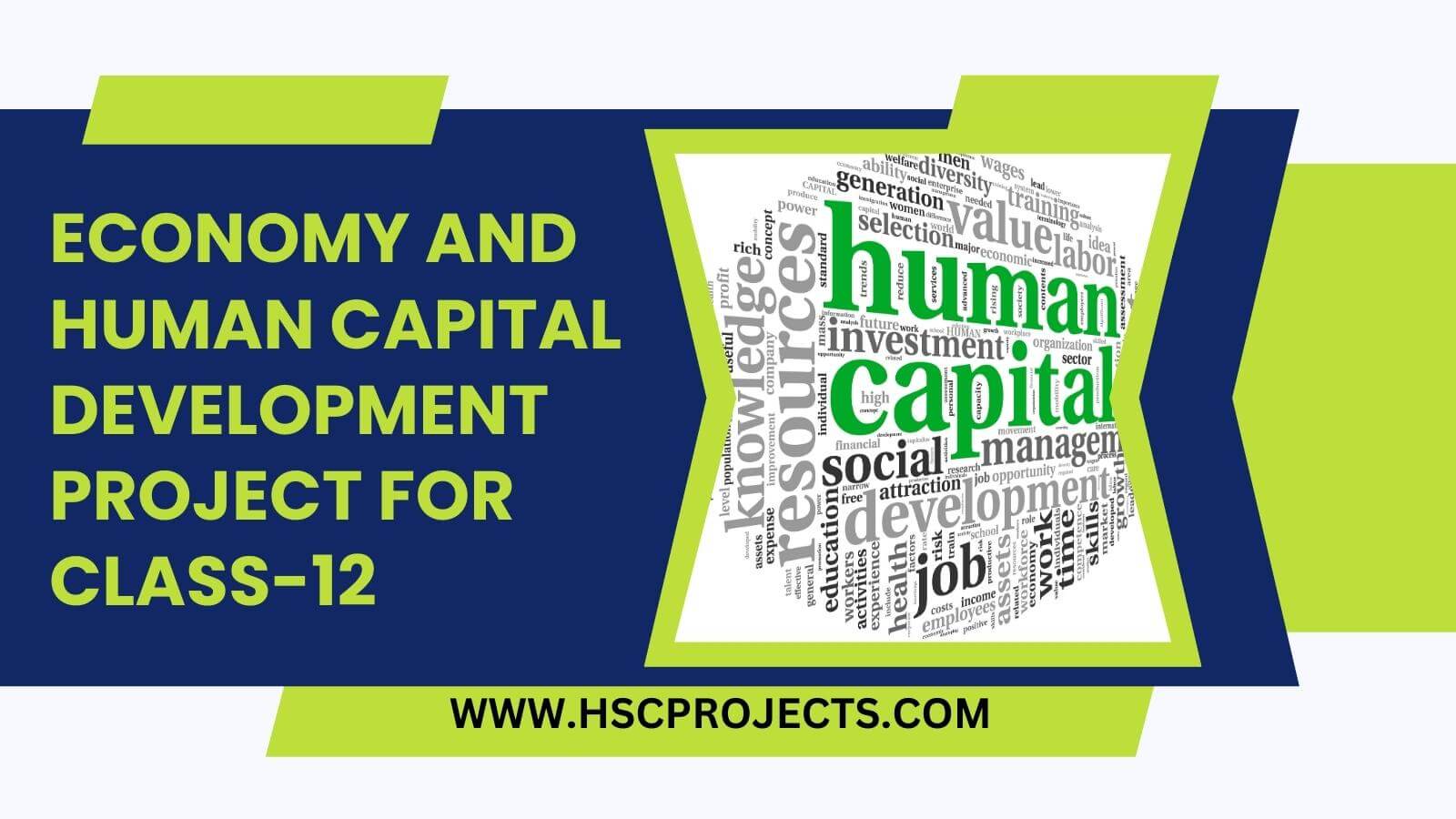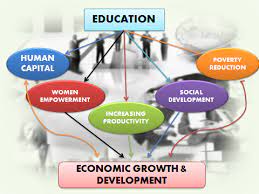
Economy And Human Capital Development Project For Class 12
Acknowledgment
I’d like to acknowledge the educators, entrepreneurs, policymakers, and investors who have contributed to the development of the economy and human capital. Your efforts have been critical in building a more prosperous and equitable society. Thank you for your contributions and inspiration to others.
Introduction To Human Capital Development And Its Importance In Economic Growth
Providing an introduction to human capital development and its crucial role in economic growth is fundamental. Human capital signifies the knowledge, skills, and abilities that individuals possess, which can be utilized to create economic value. Consequently, human capital development refers to the process of augmenting an individual’s knowledge and skills through various means such as education, training, and other forms of learning.
The paramount significance of human capital development in economic growth cannot be overstated. As the world’s economy shifts towards a knowledge-based model, the quality and quantity of human capital become increasingly pivotal determinants of a nation’s economic growth and competitiveness.
Investing in human capital development can lead to increased productivity, innovation, and technological advancement, which, in turn, can result in economic growth. Additionally, human capital development can help to reduce poverty and inequality by creating more opportunities for individuals to access better-paying jobs and contribute to the economy.
In this section, a discussion of the significance of human capital development in economic growth, the benefits of investing in human capital development, and how it can aid in addressing the most pressing economic and social challenges facing societies today would be appropriate. Furthermore, providing a brief overview of the topics covered in the remainder of the project would be advisable
The Relationship Between Education And Economic Growth

Education is a quintessential aspect of human capital advancement and a momentous contributor to financial expansion. It has the potential to amplify human capital by equipping individuals with erudition and proficiencies that can be employed to fabricate economic value.
Furthermore, it can augment productivity by enhancing the effectiveness of employees and improving the quality of end products. Moreover, education can stimulate originality by encouraging the generation of new technologies and concepts.
Exalted levels of education are correlated with elevated remuneration and better career prospects, which can ultimately lead to amplified social mobility. Education can also improve health outcomes and reduce indigence, both of which are imperative elements for financial growth.
There are assorted categories of education, such as primary education, secondary education, and tertiary education. Primary education can heighten literacy rates and rudimentary skills, while tertiary education can provide cutting-edge expertise and knowledge that are vital for specialized fields.
Educational policy plays a pivotal role in promoting economic expansion. Investments in educational infrastructure, such as schools and universities, can enhance educational access and outcomes. Additionally, policies that cultivate lifelong learning and skill development can improve human capital and amplify financial growth.
To recapitulate, education is a pivotal catalyst for economic development, and policymakers must give precedence to investments in educational infrastructure and policies that promote lifelong learning and skill development.
Investing In Human Capital: The Role Of Governments And Private Sectors
Investing in the development of human capital necessitates the joint effort of both the public and private sectors. The ensuing discussion delves into the roles of governments and private entities in this pursuit.
Governments can embark on the development of educational and training programs, provide financial aid to students, and enforce policies and incentives that encourage employers to prioritize their employees’ skill enhancement. In addition, governments can facilitate research and development activities, which may culminate in the creation of innovative technological solutions.
Private organizations can invest in the professional advancement of their workforce by conducting training programs, offering tuition reimbursements, and promoting continuing education. They can also extend support to education and training initiatives in their communities, as well as collaborate with academic institutions to devise novel approaches to economic challenges.
The Impact Of Technological Advancements On Human Capital Development

The profound impact of technological advancements on human capital development is a subject of great importance. As we move forward in a rapidly changing world, the nature of work and the skills required in the labor market are undergoing a dramatic transformation. In this section, we shall examine how technological advancements are influencing human capital development.
Our discourse shall delve into how emerging technologies such as artificial intelligence, robotics, and automation are changing the way work is performed, which, in turn, is affecting the skills that are in high demand. Furthermore, we shall examine how these technologies are altering the types of jobs available and the education and skills required to perform them.
This section aims to explore the profound impact of technological advancements on human capital development. With the fast-paced changes in our world, the nature of work and the skills required in the labor market are undergoing significant transformation. Our discourse delves into how technological advancements are influencing human capital development.
The discussion shall highlight how emerging technologies like artificial intelligence, robotics, and automation are changing the way work is performed, thus, affecting the skills that are in high demand. Besides, we shall analyze how these technologies are changing the types of jobs available and the education and skills required to perform them.
In addition, this section will examine the opportunities and challenges presented by technological advancements for human capital development. While new technologies may displace certain jobs, they can also create new job opportunities that require higher levels of education and skills. Moreover, technological advancements can improve the effectiveness and efficiency of education and training programs, leading to better outcomes for learners.
Furthermore, this section will discuss the importance of reskilling and upskilling to ensure individuals can adapt to the changing nature of work. We shall explore how individuals and organizations can leverage technology to enhance their learning and skills development.
In conclusion, this section will provide a comprehensive analysis of the impact of technological advancements on human capital development. It shall present the strategies that individuals, organizations, and governments can employ to respond to these changes.
Challenges To Human Capital Development And Economic Growth
Challenges to Advancing Human Capital Development and Economic Progress
Despite the considerable advantages of investing in human capital development, several obstacles may impede the attainment of these objectives. This section will explore some of the most significant impediments to human capital development and economic growth.
A major obstacle is the dearth of access to education and training programs, particularly among marginalized communities. The absence of education access can result in notable gaps in skills and contribute to persistent inequalities in the labor market.
Another barrier is the caliber of education and training programs. Numerous educational and training programs may not be sufficiently preparing learners for the labor market’s demands, leading to discordances between skills supply and demand.
Furthermore, this particular section can delve into the effects of demographic shifts on human capital development and economic advancement. For instance, aging populations can pose considerable difficulties for economies that depend heavily on a skilled labor force, whereas high rates of youth unemployment can impede both economic growth and social stability.
Moreover, it would be prudent to explore the impact of global economic trends, such as globalization and automation, on the development of human capital and the promotion of economic growth. These trends can result in significant disruptions to the labor market, necessitating substantial adjustments to educational and training programs to ensure that individuals are capable of adapting to these changes.
All in all, this section should present a thorough analysis of the obstacles faced in the development of human capital and the promotion of economic progress, emphasizing the requirement for effective policy measures to overcome these challenges.
Case Study: Successful Human Capital Development Programs In Developing Countries
In this section, we will examine a case study featuring triumphs in human capital development programs in developing countries. Specifically, the case study will showcase the fundamental tactics and policies that have facilitated favorable results, offering valuable insights for other nations to emulate.
Moreover, we will delve into the distinctive obstacles confronted by the nation and the means by which they overcame them through strategic and policy-driven approaches. Additionally, we will analyze the funding structures behind the successful programs, how key stakeholders were engaged, and the methods used to measure and evaluate progress.
Furthermore, we will explore the impact of these initiatives on economic expansion and social welfare. The section will examine how improved education and skills development have led to increased productivity, higher wages, and better employment opportunities.
Finally, we will consider the sustainability of these successful programs and the challenges that arise when attempting to scale them up to reach a wider audience. We will also discuss the role of collaborations and partnerships in sustaining these programs, and how the government and private sector can collaborate to ensure their continued success.
Overall, this section will provide a practical example of successful human capital development programs and offer insights into how countries can overcome challenges to achieve comparable outcomes.
Furthermore, this particular segment of the write-up is conducive for the examination of the far-reaching effects that such development programs have on both the economy and social welfare of the affected country. You may delve into how the education and skills development that result from these programs help to raise the level of productivity, lead to increased wages and create better job opportunities.
Additionally, it would be prudent to tackle the question of sustainability, and the uphill task of replicating these initiatives on a larger scale to cater to the needs of more individuals and communities. In doing so, an exploration of the significant role that partnerships and collaborations play in ensuring the continued success of these programs can also be examined. Furthermore, this section is intended to provide a practical example of the successful human capital development programs and furnish readers with insights into how these countries can surmount the challenges and achieve comparable outcomes.
The Future Of Human Capital Development And Its Implications On Economic Prosperity
The ensuing discourse shall expound upon the upcoming course of human capital development and its effects on economic prosperity. One may deliberate on the budding patterns and hurdles that are poised to fashion the forthcoming workspace and the skillsets that shall be necessary in the job market.
The impact of alterations in demographics, technological progress, and global interconnectivity on the labor market and the requisite skillsets for triumph shall also be delved into. Furthermore, one may scrutinize the probable impact of the nascent fields, namely artificial intelligence and the eco-friendly economy, on the demand for aptitudes and the varieties of jobs that shall be available.
Furthermore, this segment shall contemplate the function of education and training in priming individuals for the future workspace. One may ponder over the need for perpetual learning and the magnitude of reskilling and upskilling to certify that individuals can adjust to the ever-changing demands of the labor market.
In addition to the above, this section may scrutinize the function of education and training in preparing individuals for the forthcoming labor market. It is plausible to explore the requirement for persistent learning and the criticality of adapting and acquiring new skills to guarantee that individuals can cope with evolving demands in the labor market.
Moreover, you can discuss the potential effect of human capital development on economic prosperity. An investment in human capital can result in a surge in productivity, increased innovation, and a more comprehensive and all-inclusive economic growth.
In addition, you can evaluate the possible obstructions to achieving the benefits of human capital development and the need for practical policy responses. It is plausible to examine the responsibility of the administration, the private sector, and the civil society in promoting human capital development and making sure that the gains are equally shared.
Generally, this section should present a forward-looking point of view on the future of human capital development and its implications for economic prosperity. This section should underscore the importance of investing in education and skills development to guarantee that individuals and economies can prosper in a rapidly changing world.
Conclusion: The Need for Continued Investment in Human Capital Development to Achieve Sustainable Economic Growth
In this ultimate segment, we can succinctly recapitulate the primary discoveries and contentions set forth in this document while underlining the requirement for persistently investing in the development of human intellect to attain sustainable economic expansion.
It is imperative to underscore the fundamental role played by education and skills improvement in propelling economic advancement and social welfare. Furthermore, the significance of confronting the obstacles to human capital development, such as inadequate accessibility to education, deficiencies in skills, and demographic transformations, can be expounded upon.
In addition, it is essential to emphasize the necessity for efficient policy measures that stimulate the advancement of human capital and ensure the distribution of its benefits in a just manner. The role of governments, private sectors, and civil society can be probed in investing in educational and training programs, encouraging innovation and entrepreneurship, and fostering an enabling milieu for the development of human capital.
Further, this section can explore the potential influence of human capital development in achieving sustainable economic growth. We can delve into how investing in human intellect can lead to increased productivity, greater innovation, and more extensive, all-inclusive economic growth, thereby contributing to the accomplishment of the Sustainable Development Goals (SDGS).
All in all, this concluding section should issue a lucid, stimulating call-to-action for persistent investment in human capital development to achieve sustainable economic growth while concurrently advancing social welfare.
Furthermore, this segment can accentuate the need for effective policy responses to promote human capital development and guarantee that the gains are distributed evenly. You can delve into the involvement of governments, private sectors, and civil society in investing in education and training programs, stimulating innovation and entrepreneurship, and forging a conducive environment for human capital development.
Additionally, this part can expound on the potential impact of human capital development on attaining sustainable economic growth. You can scrutinize how channeling resources towards human capital can result in heightened productivity, amplified innovation, and more all-encompassing economic growth, and contribute to fulfilling the Sustainable Development Goals (SDGS).
Overall, this section must provide a lucid and convincing call to action for persistent investment in human capital development to attain sustainable economic growth and bolster social welfare.
Certificate of Completion
[Your Name]Class 12 StudentThis is to certify that I, [Your Name], a Class 12 student, have successfully completed the project on “Economy and Human Capital Development” for my CBSE studies. The project explores the importance of human capital development in economic growth, the relationship between education and economic growth, the role of governments and private sectors in investing in human capital, the impact of technological advancements on human capital development, challenges to human capital development and economic growth, successful human capital development programs in developing countries, and the future of human capital development and its implications on economic prosperity.
Throughout this project, I have gained a deep understanding of the crucial role human capital development plays in driving economic growth and creating a more equitable society. I have learned how education and skills development contribute to increased productivity, innovation, and technological advancement. Additionally, I have explored the challenges and obstacles faced in advancing human capital development, such as limited access to education and training programs and demographic shifts.
The project also highlighted the importance of collaboration between governments and private sectors in investing in human capital development. I have examined the impact of technological advancements on the labor market and the types of skills that will be in demand in the future. Moreover, I have explored successful human capital development programs in developing countries and how they have led to economic prosperity and social welfare improvements.
I am grateful for the opportunity to undertake this project, as it has provided me with valuable insights into the economic principles and the significance of human capital in driving economic growth. This project has broadened my understanding of the complexities of economic development and the role education and skills play in shaping a nation’s progress.
Date: [Date of Completion]Signature: [Your Signature]
In order to download the PDF, You must follow on Youtube. Once done, Click on Submit
Follow On YoutubeSubscribed? Click on Confirm
Download Economy And Human Capital Development Project For Class 12 PDF



